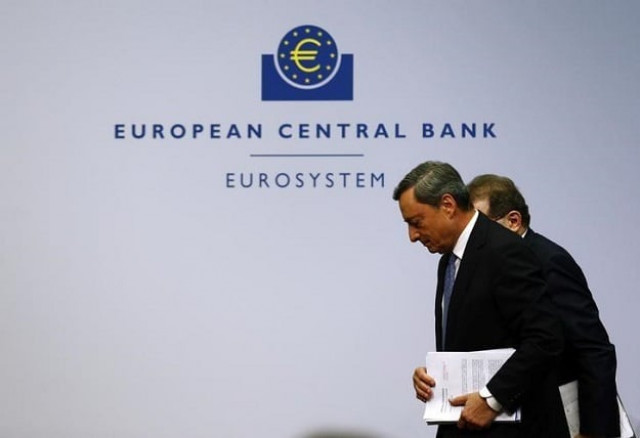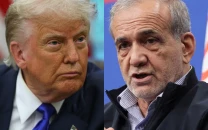ECB to hold fire while Brexit impact unclear: analysts
The eurozone economy has held steady since the June ballot, with employment and surveys of purchasing managers stable

European Central Bank (ECB) president Mario Draghi (R) and vice president Vitor Constancio. PHOTO: REUTERS
But the ECB may well start laying the groundwork for policy shifts later in the year, especially if Brexit economic pain worsens demonstrably, they predicted.
Minutes from the July gathering of the ECB's governing council -- a few short weeks after Britain's vote to leave the EU -- hinted at a response in September, when more data and the bank's internal economic forecasts would be available.
But the eurozone economy has held steady since the June ballot, with employment and surveys of purchasing managers stable and ECB figures showing loans to businesses growing by 1.3 percent in July.
European leaders to discuss EU future after Brexit shock
There are patches of shadow in the overall picture though, with inflation -- which the ECB aims to maintain at just below 2.0 percent -- remaining well shy of target, stuck at 0.2 percent in August.
A eurozone-wide business confidence survey saw a bigger than expected drop in August, falling to a five-month low.
And on Wednesday, official data showed that industrial production in the EU's economic powerhouse Germany had undergone a surprisingly sharp contraction in July.
"Industrial firms are taking a wait-and-see approach," the economy ministry in Berlin said -- while pointing to "sluggish global markets" rather than singling out Brexit as the cause.
It would be a big surprise if that single data point from Germany prompted the ECB governing council to move, said Unicredit economist Marco Valli, noting that industrial production is "one of the most volatile indicators".
Neither will the ECB want to give the impression it thinks all is well, said Natixis analyst Johannes Gareis.
The world after Brexit
"There are some positive signs, some negative signs, it's not the right time to lean back and give the impression that you've done everything you can," he told AFP.
ECB watchers have pointed to two events later in the year -- a constitutional referendum in major eurozone economy Italy and the US presidential election -- as risk factors that could require a monetary response.
The central bank "needs to save some ammunition" for its December meeting, Gareis said, in case either of those decisions presages an economic turn for the worse.
It could signal its readiness to act by tweaking the parameters of its "quantitative easing" (QE) asset-buying programme or signalling more strongly than usual that it is prepared to do so, he noted.
Both analysts agreed that record-low interest rates will likely remain unchanged, as ECB policymakers have acknowledged that negative rates of return are beginning to cut into profits for the European banking sector.
Lowering rates "is no longer that effective in weakening the euro" and thus boosting inflation, Unicredit's Valli said.
ECB board members have repeatedly stressed that many of the large package of measures announced in March are only beginning to make themselves felt.
That meeting saw the launch of a new tranche of cheap loans for banks, the expansion of QE from 60 to 80 billion euros ($90 billion) per month and its extension to corporate as well as government bonds, and an interest rate drop.
Brexit aftermath pulls down plane orders
"Our priority is to implement this comprehensive package in the best possible way," Banque de France governor Francois Villeroy de Galhau told a Frankfurt banking conference on Wednesday.
"It's likely the ECB will maintain its easing bias, and will probably message about it by changing QE parameters or giving some concrete hints," Natixis analyst Gareis said.
The council could announce an extension of the QE programme beyond the existing cutoff date of March 2017, an option ECB president Mario Draghi regularly says is on the table if inflation looks far off target close to that time.
Room for manoeuvre could also be found by changing the rule which bans the ECB from buying bonds yielding less than its deposit rate, which currently stands at -0.4 percent, meaning banks pay to park their cash at the ECB overnight.
But Unicredit's Valli suggested that the ECB "will not announce anything concrete" for now, preferring to bide its time until the magnitude of Brexit's impact on the economy solidifies.
"How do you project the impact of Brexit on your economy in the eurozone? It's very hard," he said.



















COMMENTS
Comments are moderated and generally will be posted if they are on-topic and not abusive.
For more information, please see our Comments FAQ